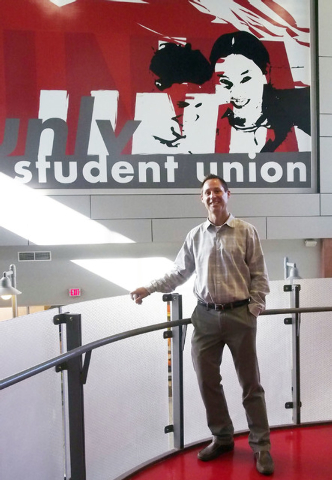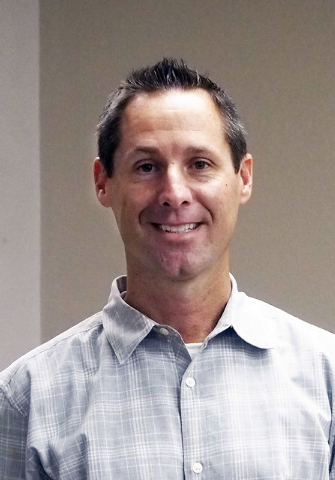Lecturer brings life lessons to classroom
Danny Siciliano doesn’t use just a textbook to instruct his accounting students at the University of Nevada, Las Vegas.
He provides them with real-life financial experience, too.
Siciliano joined the UNLV Lee Business School two years ago after spending nearly 20 years in public accounting and corporate gaming. He teaches upper-level accounting courses in the same classroom where he earned his undergraduate and graduate degrees in accounting and finance.
Siciliano also draws on his Las Vegas business background in coordinating the accounting department’s internship program. He reaches out to former accounting and gaming contacts to land internships for UNLV students.
In the classroom, Siciliano often cites business examples he experienced during seven years as a public accountant and auditor with Deloitte &Touche and 13 years as a top executive with slot machine makers Anchor Gaming and International Game Technology.
“If I can relate a topic to something that took place in my career or their life, the subject becomes much more meaningful to the students and chances are they gain a better understanding of the concept,” Siciliano said.
As a public accountant, Siciliano handled work for The Howard Hughes Corp., Clark County, Pacific Engineering &Production Company of Nevada, and Boyd Gaming Corp.
He left public accounting to join a client, slot machine developer Anchor Gaming, as corporate controller in 2000. Two years later, Anchor was purchased by slot machine giant International Game Technology. Siciliano spent 10 years as the company’s treasurer and chief accounting officer.
“I wanted to go into public accounting because I knew I wanted to become a CPA (certified public accountant),” Siciliano said. “In my opinion, it’s the best credential you can have coming out of a business education. Often, with a path in public accounting, you end up with a company. That’s the path I advise some of my top students to take.”
During his tenure with IGT, the company underwent a growth spurt and Siciliano was involved in corporate acquisitions and capital financing efforts. IGT was one of the top performers on the Standard and Poor’s 500 from 2003 to 2007.
“With many issues, I often try to tell the students how we dealt with a certain topic at IGT,” Siciliano said.
Siciliano brings some of his longtime gaming industry colleagues in as guest speakers for classes, including ex-IGT CEO T.J. Matthews and former Shuffle Master Chief Financial Officer Richard Baldwin. As a student, Siciliano was impressed by a classroom talk from then-Southwest Gas Corp. CEO Kenny Guinn, who would serve two terms as Nevada’s governor.
“That was so incredibly useful,” Siciliano said.
Question: What brought you back to the classroom?
Answer: There was an opening in the management and accounting department that coincided with my retirement from IGT. I didn’t know what I wanted to do at the time, but I knew I was done with the corporate life. I enjoy preparing students for the job market. The school has a great relationship with the Las Vegas accounting community and the gaming community because a lot of the senior executives in those companies came out of UNLV. Our job placement rate is over 90 percent and employers rank our students highly on the internship program. A lot of students are successful getting jobs at those companies.
Question: How important is the internship program?
Answer: Internships are hugely important for students. I didn’t have an internship and my first couple of years at Deloitte weren’t as strong as they could have been because I didn’t have much real-world experience. Internships help an employer determine if a student is a good candidate for a job. It’s now expected that students have an internship before they go out and apply for their first job. I cultivate my contacts and reach out as broadly as I can to find internships. We have 500 upper-division accounting students and 100 students in the master’s program. When we find a suitable internship, we broadcast it out for students to apply.
Question: What prompted you to leave public accounting?
Answer: I was a manager at Deloitte and the next progression was to become a partner. I decided I didn’t want to be a partner and once you make that decision, you have a couple of years to act. At the same time, Anchor acquired Powerhouse Technologies and had an open position at the corporate controller spot. I knew the company well. Public accounting gives you a lot interesting insights into your clients.
Question: How did your CPA training translate into the corporate world?
Answer: Deloitte was a national leader in training and coming up with strong people. A lot of people who were at Deloitte when I was there are all over Las Vegas now in finance and gaming. That training translates well into the corporate environment. The transition in my first job with Anchor was easier because I worked the account with the former corporate controller of Anchor for seven years. I got to see how the Anchor folks did everything. It made it much easier to go to the other side. It’s easier to manage auditors when you have already walked a mile in their shoes.
Question: What are some ways you advise students?
Answer: My management accounting class is for second semester sophomores and all business majors have to take the course. It allows me to talk about careers. Those students have to make a decision by the end of the semester about their major. I try to develop relationships with the students to see if they are interested in accounting. Some I might direct toward marketing or finance. The upper-division class I teach is an advanced version of management accounting. That class is for accounting majors and it has some very serious students. T.J. will come into that class and discuss making good decisions based on numbers. He adds value because he’s not an accountant and he gives the students great advice.
Question: What’s the difference between accounting and finance?
Answer: That’s an active discussion topic with students. Some want to go to Wall Street or become a CFO. Accounting is a good degree for that because it helps you get into finance. It’s kind of like the difference between playing offense or defense. The controller and accountant records things that have happened and they make sure everything is reported properly. In finance, you deal with future transactions.
Contact reporter Howard Stutz at hstutz@reviewjournal.com or 702-477-3871. Follow @howardstutz on Twitter.



















